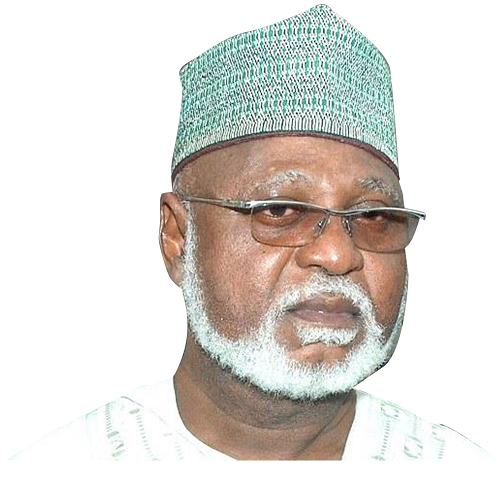
Gen. Abdulsalam Abubakar, former head of state and chairman, National Peace Committee, is rated as primarily fitting for the job of trouble shooting. He has etched himself as an international statesman after he implemented a smooth transfer to democratic rule within eleven months that he was in charge.
The National Peace Committee is a non-governmental entity, composed of eminent Nigerians, with the mandate to monitor compliance with the Abuja Accord, which political parties have been made to be signing since the 2015 elections. The committee is also required to explore mediated solutions to any disputes arising from elections.
Abubakar came into office as a military head of state on 9thJune 1998 and handed over to a democratically elected government on May 29th1999. The short transition programme of his administration is considered instrumental to dousing heightened political tension at that time.
The annulment of the presidential election held under the administration of Gen. Ibrahim Babangidartd. In 1993 was yet smoldering and the death of Chief M. K. O Abiola – the acclaimed winner of the election while in detention was leading the nation to a flashpoint.
Myriad political, social and economic problems ensued, which at several dramatic points, pushed a restive nation to the edge of chaos.Nigeria was plunged into a crisis Abubakarunderstood could be quelled only by quick and decisive actions to return the nation to democratic governance.
Abubakar’s quick transition programme to democratic rule, alongside behind the scene balancing of ethnic and tribal contentions, successfully diffused the explosive political tension and provided a new way forward for the nation.
He took steps to reach out to Nigerians in order to ascertain what they wanted at that point in time. “It is quite clear from the efforts we have made to reach out to the people that Nigerians want nothing less than true democracy and a united and peaceful country.” His goal of returning the country to a democratically elected civilian government was his strategy for securing peace for the nation.
Abubakar took a number of steps that were reconciliatory – a kind of olive branch approach to the issues of national and regional vexation. He opened doors of freedom to political prisoners and implemented a reform programme that included the adoption of a new constitution that ushered in civilian government in less than a year.
He made a promise of an early return to democratic governance and kept his word to the surprise of many who were then discouraged by many failed promises of the military in the past. He established the Independent National Electoral Commission (INEC), which held a series of elections from local governments, then state assemblies and governors, ending with national assembly and presidential elections in February 1999.
Since then, his exit mode from power has been speaking for him as a worthy statesman and a peacemaker. The nation has continued to depend on him as a national peace broker and he has also been highly sought after for international peace shooting engagements. Whenever rising tension grips the polity, Abubakar has been found at the mellowing down handle. He has since been on the job of charting a course of stability and peace out of Nigeria’s tempestuous electoral cycle.

In the 2011 general elections, as many as 600 persons were reported to have been killed in a violence that erupted from the declaration of the results of the presidential election. In an effort to avoid a reoccurrence in 2015, the idea of a peace committee was floated for the purpose of dousing political tension.
The idea found an expression in a sensitization workshop on non-violence convened on January 14 2015 in Abuja. At the end of the workshop, 11 presidential candidates signed the Abuja Accord as it was later framed, which disallows vicious campaigns and violence.
The accord provided for the creation of the National Peace Committee, which has since then, been headed by Abubakar as chairman. The committee serves as a platform for the implementation, monitoring of adherence to the peace accord and mediation on issues arising among the signatories. It has continued to act as a watchdog that cautions on actions and utterances that can trigger off crisis.
Abubakar also led contestants in the 2019 elections to sign an agreement to maintain peace and abide by the outcome of the people’s votes. While negotiating the agreement, he declared his mission to get political parties in Nigeria to become actors of peace. “You are working to maintain peace, you must not do anything to make a bad situation worse”, he urged the contestants.
Abubakar is actively involved in peace building processes across Africa. In recognition of this, the AbdulsalamiAbubakar Institute for Peace and Sustainable Development Studies (AAIPSDS) established in 2002 was named after him.The Institute is his contribution towards providing a platform for re-vitalizing the teaching, learning and studies of peace, conflict, peace-building education and practice in Africa.
Over the years, AAIPSDS has engaged in diverse activities that have impactedpositively key issues and challenges confronting Nigeria. Some of these activities include the United Nations International Peace Day lecture Series and strategic workshops and roundtable.
The annual International Peace Day lecture series has provided a platform that has brought to the fore critical issues that could positively or negatively impact on building sustainable peace in Nigeria and Africa at large. The 2018 international peace day lecture series was titled“Building Bridges; One Child; One Youth; One Adult for Peace.
Strategic workshops of the institutebring together stakeholders and partners on critical issues that affect peace building and sustainable development in Nigeria.


